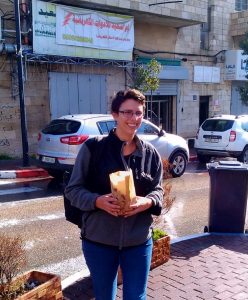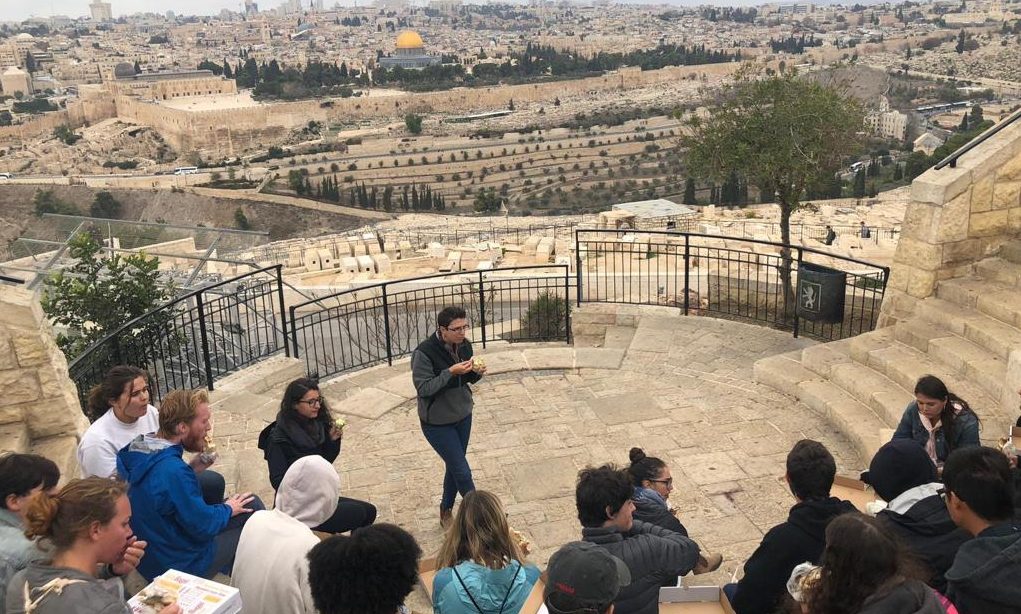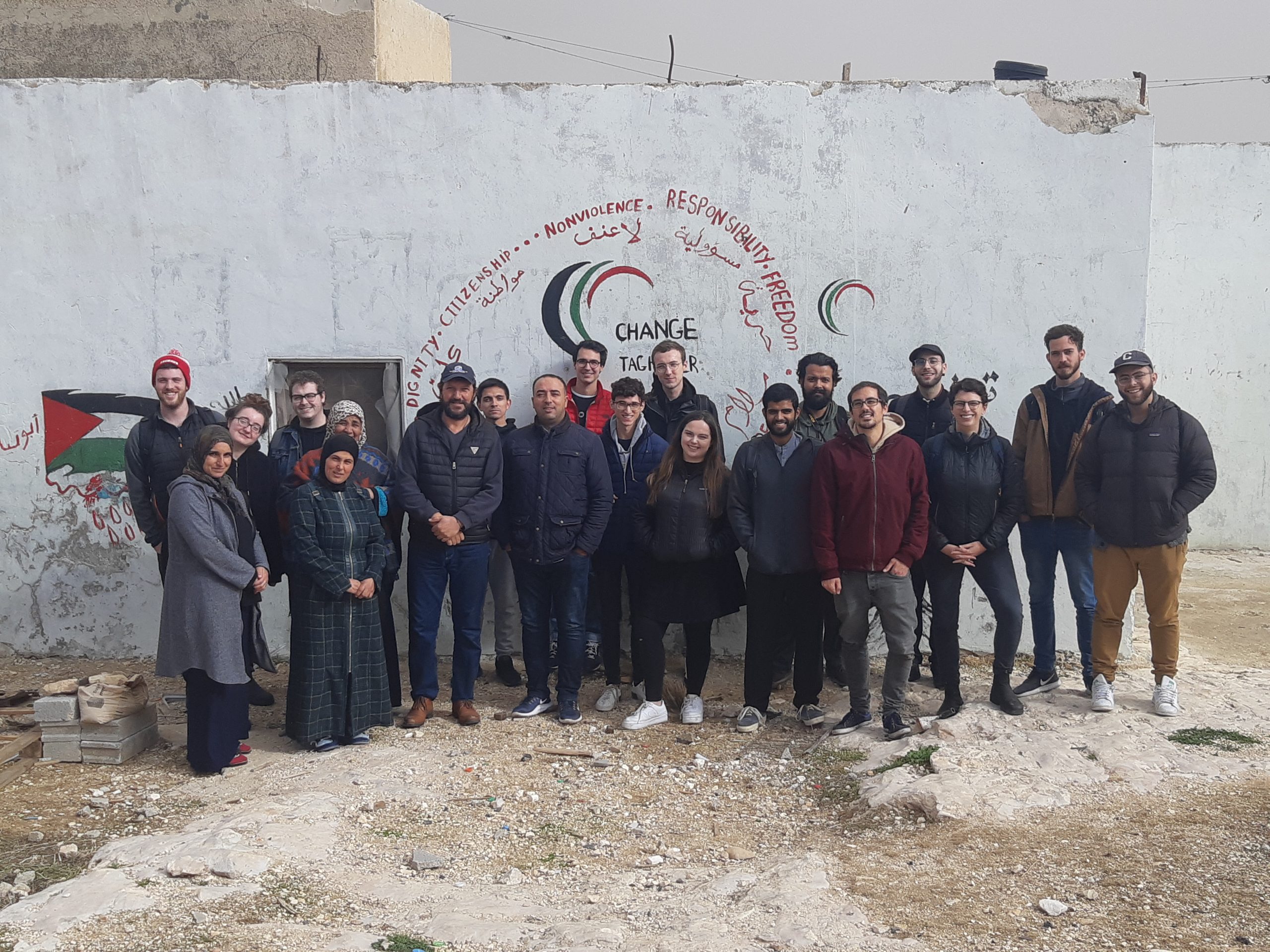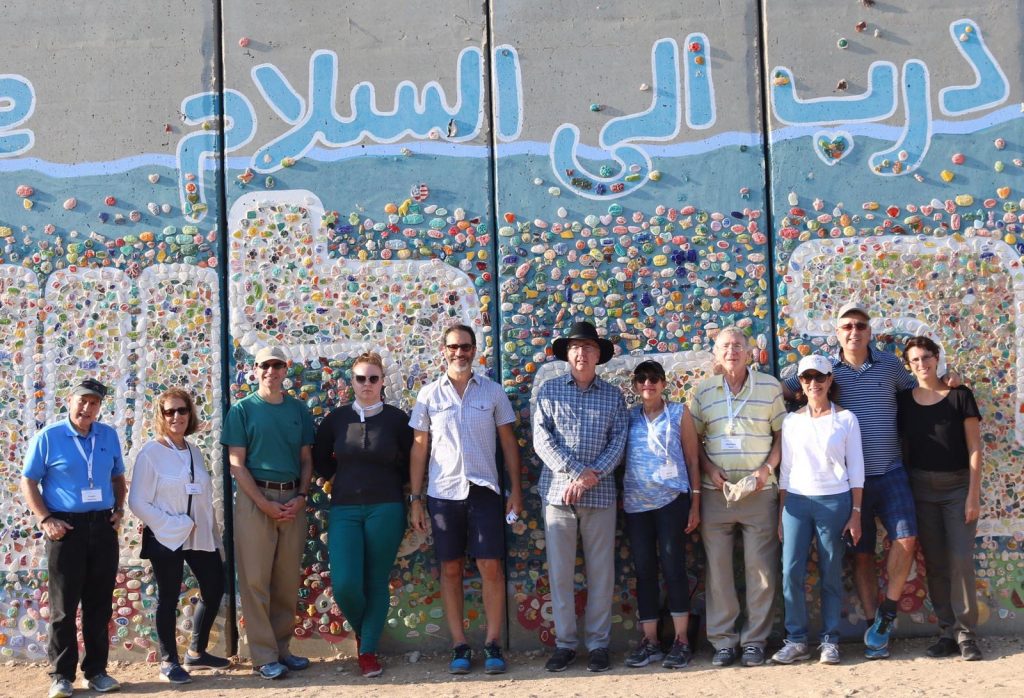- About Us
- Policy Center
- Learn
- Press Room
- Blog
- Get Involved
- Donate
- Donate to J Street Online
- Make a Gift in Someone’s Honor or Memory
- Make a Monthly Gift
- Tax-Deductible Donations
- Giving by mail
 Assistant Israel Director Eve Lifson made aliyah from the United States shortly after college. Working in J Street’s Tel Aviv office, she coordinates Israeli and Palestinian speaker programs and designs and runs J Street’s on-the-ground trips with students, foreign policy professionals and members of Congress.
Assistant Israel Director Eve Lifson made aliyah from the United States shortly after college. Working in J Street’s Tel Aviv office, she coordinates Israeli and Palestinian speaker programs and designs and runs J Street’s on-the-ground trips with students, foreign policy professionals and members of Congress.
What drew you to make aliyah?
The reasons that I made aliyah, and continue to stay, have changed over the years as I build my life here.
I was 23 when I made aliyah, fresh out of college. I wasn’t sure if I would stay in Israel but I spent my college years deeply engrossed in all things Israel/Palestine. I was fed up with the campus bubble. I wanted to be in the middle of the action trying to make a difference. At the time, I thought I knew I didn’t want to be “Israeli,” but a lot of things changed in the past seven years.
I made aliyah in a collective framework together with other graduates of Habonim Dror North America, who wanted to actualize the dream of building a more just and equal Israeli society. Through the Dror Israel movement of Israeli educators, I was thrown into Israeli society headfirst, working with Israeli youth and taking on more and more responsibilities. Through blood, sweat and tears I went from speaking broken Hebrew to being conversationally fluent. I started to integrate more and — along with the trials and tribulations of being an “olah hadasha” (new immigrant) — came the joy of being a part of something greater than myself. I feel as though I’m staking out my own place in one of the greatest stories of all time, the story of the Jewish people.
And yes, I became Israeli. And surprising even myself, I don’t hate it.

Leading a debrief after a student trip to a Palestinian village. Sitting at the Mount of Olives viewpoint looking over the Old City. (Fall 2018)
What does being Israeli mean to you now?
For me, being Israeli means that I can be a secular Jew and live a fully Jewish life. My year is marked by the Jewish holidays, which align with the seasons and harvests. I don’t need to pray to a higher being I don’t believe in to be immersed in Jewish tradition. I hike in the Galilee, passing by the agricultural fields that Jewish pioneers sowed and plowed, making the desert bloom against all odds. In the Golan Heights, I am shaded by the eucalyptus trees Eli Cohen planted as a spy in Syria. In the Negev, I stay with my in-laws at one of 11 points that early pioneers established in a secret overnight operation in order to expand the borders of the future Jewish state.
Jewish history in the region, both ancient and modern, flows through every town and landscape. The history is complex. One people’s miracle created another’s people’s great tragedy. I find myself making a life in Israel on account of both — in celebration and continuance of the revival of the Jewish people and the pursuit of the Zionist dream, as well as out of responsibility to peace and justice for Palestinians and all people who call this place home, and deserve the same freedom and connection with the land that I have.
What drew you to J Street U?
I was one of the few J Street U leaders who wasn’t recruited by a campus organizer or another student. I went looking for J Street when I arrived on campus!
After high school, I spent a gap year in Israel on Habonim Dror North America’s (HDNA) Workshop program. Through my experiences with HDNA in Israel, I began to embrace progressive Zionism — the idea that we have a homeland for the Jewish people today in the State of Israel, but that our work is not yet done. That we must work to make Israel a more just, more equal, more peaceful place.
Arriving back in the US and starting my first year of college, I had heard from others that J Street U was the place for progressive, pro-Israel students. J Street U taught me about political organizing, how to identify partners, how to grow a movement.
What was your first real experience seeing the occupation, and the impact that it had?
When I was 16, I participated in a summer tour to Israel with Habonim Dror North America. We spent most of the summer hiking and visiting historic sites. During one of our evening activities, we read an article about the demolition of the home of a Palestinian terrorist.
For most of the teens in the room, it was probably another boring session that they were just waiting to leave. I was completely engaged. Why would Israel demolish a Palestinian home? Even though one of the family members had committed an act of terror, and harmed or killed Israelis, I still couldn’t understand how demolishing a family home could possibly make the situation any better. Wouldn’t this breed more hatred for Israelis? Isn’t this what they call a “cycle of violence?”
I don’t think at that point I knew what the occupation was, but I did understand that somehow Israel had the authority to demolish Palestinian homes at its own discretion, and that sounded pretty insane to me. After I began working for J Street in Israel, I learned that home demolitions are not just used as a punitive measure against terrorism — they are also part of a system of creeping annexation designed to restrict Palestinian building and to prevent Palestinians living freely on their land.
When I visited the Palestinian village of Susya, I saw firsthand how many homes and wells have been destroyed for no justifiable reason. The residents of Susya have tried every means possible to build their homes legally, investing lots of time and resources in designing a master plan for their community. They have been denied at every turn and are embroiled in endless legal battles simply to be able to continue to live on their land. Every time I visit Susya, I am in awe of the strength and perseverance of the community, and angered by the occupation which continues to deny their freedom.

Student trip to Jubbet ad-Dhib, photo with the women’s council of the village and Ali Abu Awwad, founder of Taghyeer Movement (Dec 2019)
You see virtually all of J Street’s Israel delegations and tours up close. What are they like for the participants?
Our delegations have been called life-changing by members of Congress, who are so moved and impacted by their interactions with Israelis and Palestinians who are impacted by the conflict and struggling to create change. On one trip, we had a video conference with teachers in Gaza while sitting only a few kilometers away from the border. A member of Congress was so moved by the hardships the teachers faced, and their passion to be a positive force, that she came up to the computer to speak face-to-face with them. In tears, she thanked the women for all of their hard work and expressed her solidarity with them.
We also meet with Israelis living in communities alongside the Gaza border. The story of the Israeli agricultural community Netiv HaAsara is always a moving one. When Israel and Egypt made peace, the community had to leave their homes as part of the agreement. One resident described this by saying, “It is a very difficult thing to be uprooted from your homes. But peace is a very good reason to do this.” The residents of Netiv HaAsara stress that they chose to rebuild their community inside of Israel proper, and on land that is not disputed, so that they will not run the risk of having to uproot their lives again. Still, despite their sacrifices for peace, they live in constant fear and trauma of rocket fire from Gaza. Their enduring hope for peace with their neighbors is inspiring, and a reminder that security and peace are inextricably linked.
On another trip, we visited the village Jubbet ad-Dhib and heard from the women who have fought against the occupation to build a school and medical clinic in their community. From that moment on, there was a member of Congress who would refer back to the struggles of “the good people of Jubety” in his remarks whenever meeting with other speakers as he explained what the group had seen and heard so far.
More often than not, the most memorable moments for participants in delegations are meetings with Palestinians living in villages in rural parts of the West Bank — the type of people whose stories they have never previously heard. Hearing from Palestinians who are fighting for basic rights such as access to water or building a school for their children is absolutely devastating, but it also ignites a fire to fight to protect human rights and promote peace for both Israelis and Palestinians.
These moments also challenge the notion that Israeli government policies in the West Bank serve first and foremost security concerns. What does restricting access to water have to do with preventing terrorism? Meeting with the Palestinians who are hit the hardest by the occupation is not only heartbreaking, it also raises important questions about the purposes of the occupation.

A photo from J Street’s October 2018 Leadership Delegation at the Path to Peace Wall, Netiv HaAsara.
What’s the thing you wish American Jews would understand about Israel and/or the conflict?
I interact a fair amount with progressive Jews who are my age or younger, who are fed up with the direction that Israel has taken in the past decade, for many of them, it’s the only Israel they’ve ever known. A lot of them are looking for a way to wash their hands of Israel, seeing the recent annexation plans as an opportunity to draw a line and cut all ties. I find myself wanting to plead with them, wanting to tell them not to abandon us.
The impact of the US and the international community on Israel cannot be understated. The last four years under a Trump administration have proven how drastic this impact can be. I’m not just talking about picking up the pieces of the failed “Trump plan” and the botched relationship with Palestinian leadership. I’m also talking about the daily lives of Palestinians under occupation.
Home demolitions and settlement expansion have soared thanks to the implicit greenlight from the American administration. Lives have been devastated, and these policies continue without any accounting for them. My wish is for diaspora Jews to continue to engage with Israel, and despite the heartbreak and the disillusionment of the current reality, to continue to fight for peace and justice for all Israelis and Palestinians.
Don’t abandon us. We need you.